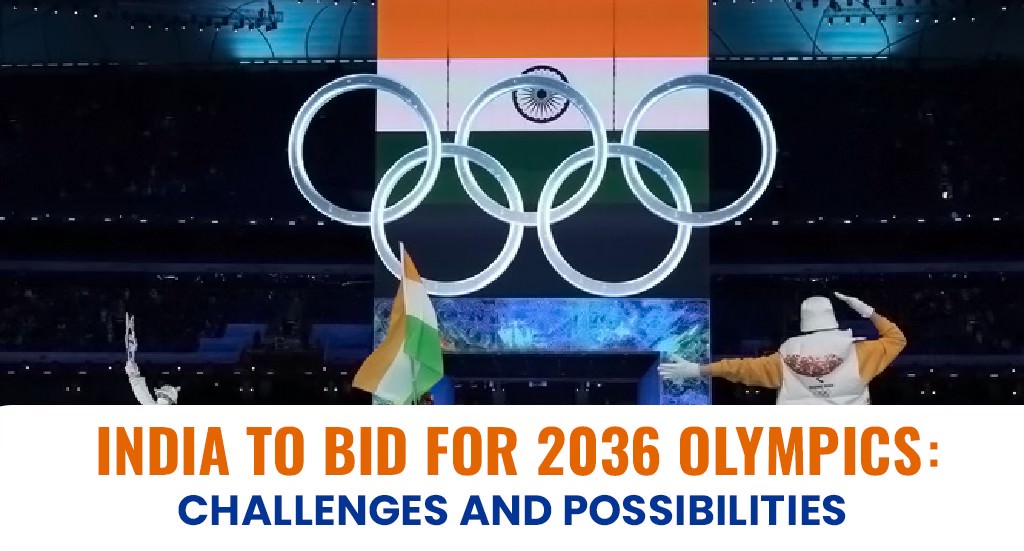Prime Minister Narendra Modi recently announced that India would bid to host the 2036 Olympics. The Indian PM made the statement while addressing the 141st International Olympic Committee (IOC) session in Mumbai, emphasising the government’s commitment to bring the Games to India for the first time and ensure its success.
Reports suggest that in the coming weeks, the Indian government and the Indian Olympic Association (IOA) are set to establish a collaborative committee, whose purpose will be to define the way forward for the Olympic bid. It’s pertinent to note that any decision regarding hosting the 2036 Olympics won’t be made until after the IOC’s election next year.
However, this endeavour marks only the initial phase of a prolonged process that entails years of discussions, behind-the-scenes advocacy, the construction of extensive Games-related infrastructure, and a substantial financial commitment. India has to surmount various challenges from this point until the announcement of the winning bid.
To begin with, the formal declaration of interest should originate from the Indian Olympic Association (IOA). Notably, the IOA’s inability to appoint a CEO has become a source of concern and contention.
It is important to have a suitable infrastructure in place before a country aims to host games at such levels. Securing the Olympics for India will be a difficult challenge. Notably, more than ten countries have already indicated their desire to host the 2036 Olympics.
The time frame that a country is awarded to become the host of the Olympic Games varies. Tokyo and Paris were designated as hosts seven years before the respective Olympic events, while Brisbane managed to secure the 2032 Games an impressive 11 years ahead of time.
For any country to gain approval to host the Olympic Games, it must successfully undergo a “feasibility study” conducted by the Future Host Commission of the International Olympic Committee (IOC). This commission is responsible for assessing and proposing potential hosts for the Olympic Games.
How it works
The process that any bid must undergo before being accepted by the IOC involves several stages. Once a city or region formally notifies the IOC of its desire to host a future Olympic event, the IOC initiates a “continuous dialogue phase” with the potential host. It’s essential to clarify that this ongoing dialogue doesn’t exclusively pertain to the 2036 Games; it could also encompass discussions related to hosting a subsequent edition of the Olympics.
Before officially embarking on the bidding process, India must identify a city that possesses more than just a massive stadium; it needs to have the essential infrastructure to support multiple sports. India is considering Ahmedabad as the potential venue for the Games, primarily due to its possession of the world’s largest cricket stadium, capable of accommodating up to 132,000 spectators. Additionally, the stadium served as the host for the National Games in 2022, marking a significant initial step towards a much larger undertaking.
However, the journey to becoming the host of the world’s largest sporting event is far from straightforward.
India has hosted two major sporting events – the Asian Games and the Commonwealth Games, held in 1982 and 2010 respectively While both provided Delhi with significant infrastructure development, including stadiums and road improvements, these efforts were relatively modest in comparison to the scale preparation for the Olympics requires. The Olympics require at least 30 different events involving participants and officials from over 200 countries. Therefore, regardless of which city is chosen to be developed as the Olympic host city, a crucial consideration is how the event will benefit the host city economically.
If substantial public funds are to be allocated for this endeavour, it is essential to have a plan for repurposing the infrastructure for future use. This approach serves as the foundation for ensuring that the prestige and economic benefits of hosting the Olympics will have a lasting impact.
This IOC session marked India’s second time as a host country. The first instance was forty years ago, in 1983 when New Delhi was the host city.
This year’s event was graced by prominent figures in the global sports community, including IOC President Thomas Bach.
India can put its best foot forward as it takes the biggest leap in sports to become a successful host for such a huge event.








